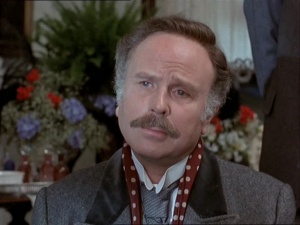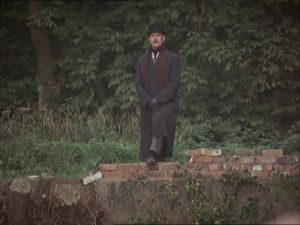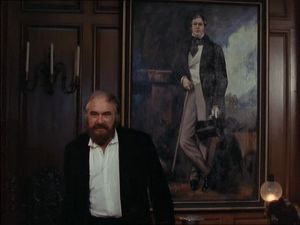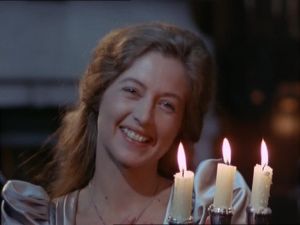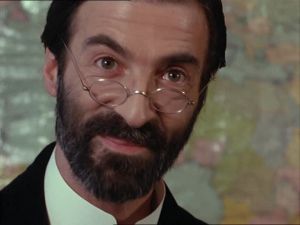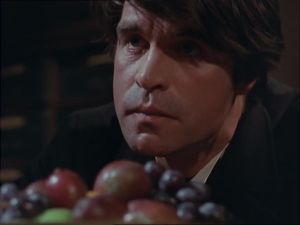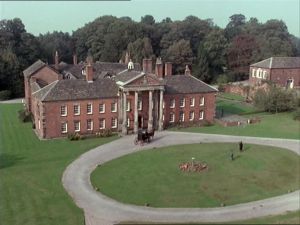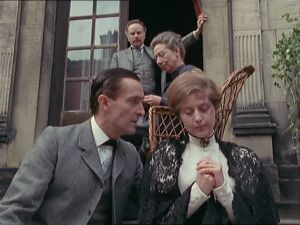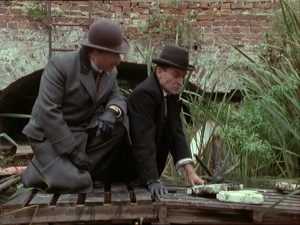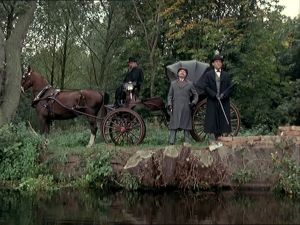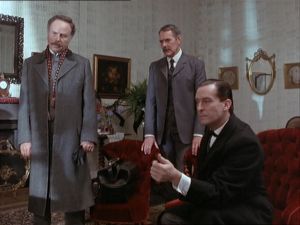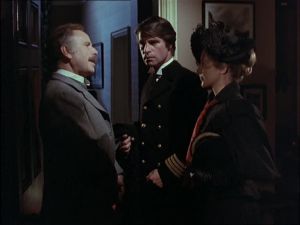The Abbey Grange (TV episode 1986)
| << S03E04 The Musgrave Ritual | S03E06 The Man with the Twisted Lip >> |

The Abbey Grange (episode No. 18) is the 5th episode of season 3 of the Granada series: Sherlock Holmes (The Return of Sherlock Holmes), starring Jeremy Brett as Sherlock Holmes and Edward Hardwicke as Dr. Watson, aired on Granada TV on 6 august 1986. 51 min.
The episode is an adaptation of Arthur Conan Doyle's short story : The Adventure of the Abbey Grange (1904).
The Abbey Grange should fulfil many viewers' expectations. Its script gives Holmes more detective work than Conan Doyle's short story by leaving him to unfold the cruel fate Brackenstall inflicted on Fudge. The whole story is wrapped in suspense and mystery: what is the secret concealed in the three glasses which mesmerize Holmes? What is he expecting, when he pays a visit to the Adelaide-Southampton line office? Will he find Crocker guilty or not guilty? Situation sudden shifts come up, like Holmes' unpredictable decision to return to the Abbey Grange, and make the plot more enthralling. The story reflects the raw violence of an actual Victorian drama: Brackenstall insults coarsely Mary, strikes her face, and his ferocious fight with Crocker is realistically filmed. Yet there is a place for humour and we have great fun watching the hurried way Holmes and Watson try and acquit Crocker. Moreover, the audience is presented with a beautiful love-story between a charming heroine and a chivalrous hero. Artfully directed, the episode is also remarkably aesthetic: it shows Mary's dainty beauty, the reflection of Hopkins', Watson's and Holmes' faces in a richly framed mirror, and Holme's patrician profile standing out against the light background of 221B window. Every facet of the detective shimmers through Brett's compelling performance. He conveys with obvious cleverness Holmes' both funny and touching vulnerability and all the fleeting emotions he feels when Mary expresses her gratitude by throwing her arms around his neck. Holmes' embarrassment, mingled with amusement and liking, shows in his short smile and his gentle but resolute gesture, which removes from his neck Mary's hand as if it were some troublesome insect that he didn't want to crush nevertheless. Enhanced by Patrick Gowers' romantic or dramatic music, The Abbey Grange is, indeed, a magnificent episode.
Photos
-
Sherlock Holmes
(Jeremy Brett) -
John Watson
(Edward Hardwicke) -
Inspector Hopkins
(Paul Williamson) -
Sir Eustace Brackenstall
(Conrad Phillips) -
Lady Mary Brackenstall
(Anne-Louise Lambert) -
Theresa Wright
(Zulema Dene) -
Mr. Viviani
(Nicolas Chagrin) -
Captain Crocker
(Oliver Tobias) -
Abbey Grange
-
-
-
-
-
Cast
- Sherlock Holmes : Jeremy Brett
- John Watson : Edward Hardwicke
- Inspector Hopkins : Paul Williamson
- Sir Eustace Brackenstall : Conrad Phillips
- Lady Mary Brackenstall : Anne-Louise Lambert
- Theresa Wright : Zulema Dene
- Captain Jack Crocker : Oliver Tobias
- Mr. Viviani : Nicolas Chagrin
Crew
- Producers : Michael Cox, June Wyndham-Davies
- Director : Peter Hammond
- Screenplay : Trevor Bowen, John Hawkesworth
- Music : Patrick Gowers
Plot summary (spoiler)
Inspector Hopkins puzzled to know why and by whom Sir Eustace Brackenstall has been murdered asks for Holmes' assistance. But when the detective arrives at the Abbey Grange, Hopkins apologizes, saying he has disturbed him for nothing since Lady Mary's evidence proves the Randall gang guilty. Mary claims the criminals have struck and tied her up, then have murdered Sir Eustace, who went to her rescue. Her story, though confirmed by her maid Theresa, doesn't convince Holmes, haunted by the three glasses the burglars are supposed to have drunk some port in. While returning to London, Holmes suddenly decides to turn back, for the truth has dawned upon him: the dregs found in the third glass exclusively betray a performance from Mary and Theresa to charge the Randall with the murder and shield the real culprit. Near Abbey Grange, Holmes unearths a broken stele dedicated to Fudge, Lady Brakenstall's dog, and gathers that Sir Eustace butchered the innocent pet and is responsible for Mary's marks of blows, though she pretends he was a good husband. She refuses to tell Holmes what actually happened during the fateful night, so the detective inquires at the shipping company which brought her to England and learns that she travelled on the ship whose first officer was Jack Crocker. The story ends at Baker Street. Holmes knows Crocker has killed Brackenstall, but he is set on taking time to mull the case over. Summoned by a telegram from Holmes, the sailor confesses he loves Mary, abused by her alcoholic and violent husband, and used to meet her secretly. But the last time, Brackenstall burst in and rushed at his disarmed rival. A fight to the death ensued and Crocker killed his attacker. To clear Mary of suspicion, he made up with Theresa a story incriminating the Randall. Holmes and Watson, convinced that Crocker's morals are beyond reproaches, proclaim him not guilty and free to go. A happy future opens before Crocker and Mary.
- Credits : Monique Claisse (texts). Sarah Fava, Granada (photos).

